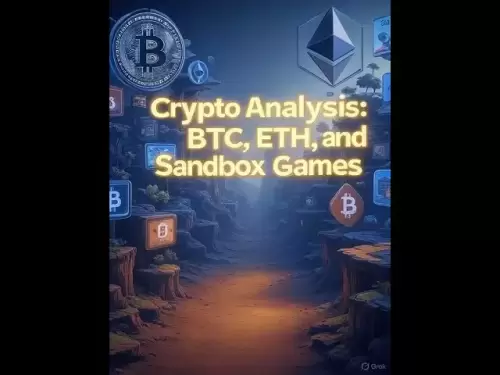-
 Bitcoin
Bitcoin $118100
-0.44% -
 Ethereum
Ethereum $3585
5.43% -
 XRP
XRP $3.434
5.65% -
 Tether USDt
Tether USDt $1.000
0.02% -
 BNB
BNB $743.8
3.89% -
 Solana
Solana $178.7
3.84% -
 USDC
USDC $1.000
0.03% -
 Dogecoin
Dogecoin $0.2381
12.81% -
 TRON
TRON $0.3270
3.62% -
 Cardano
Cardano $0.8315
4.93% -
 Hyperliquid
Hyperliquid $44.51
-4.42% -
 Stellar
Stellar $0.4710
1.52% -
 Sui
Sui $3.896
-2.51% -
 Chainlink
Chainlink $18.09
6.98% -
 Hedera
Hedera $0.2681
9.31% -
 Bitcoin Cash
Bitcoin Cash $516.7
4.83% -
 Avalanche
Avalanche $23.95
6.96% -
 Shiba Inu
Shiba Inu $0.00001490
5.67% -
 UNUS SED LEO
UNUS SED LEO $8.966
0.80% -
 Toncoin
Toncoin $3.294
4.39% -
 Litecoin
Litecoin $105.4
4.69% -
 Polkadot
Polkadot $4.356
5.30% -
 Uniswap
Uniswap $10.29
17.25% -
 Monero
Monero $327.9
-3.04% -
 Bitget Token
Bitget Token $4.942
4.33% -
 Ethena USDe
Ethena USDe $1.001
0.08% -
 Pepe
Pepe $0.00001348
2.17% -
 Dai
Dai $1.000
0.02% -
 Aave
Aave $320.8
0.58% -
 Bittensor
Bittensor $411.8
-4.07%
What are the risks of trading Bitcoin futures?
Bitcoin futures carry high volatility, leverage risks, and potential for sudden losses, requiring disciplined risk management and awareness of market uncertainties.
Jul 14, 2025 at 01:28 am
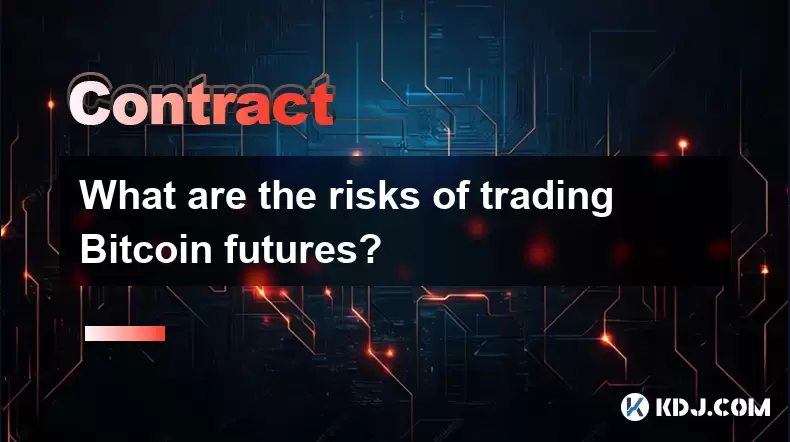
Market Volatility and Price Swings
Trading Bitcoin futures involves exposure to the high volatility of the cryptocurrency market. Unlike traditional financial assets, Bitcoin's price can experience dramatic fluctuations within short timeframes, sometimes moving by double-digit percentages in a single day. This level of volatility increases the risk of sudden losses, especially for traders who are not well-prepared or lack proper risk management strategies.
Futures contracts are leveraged instruments, meaning traders can open large positions with relatively small capital. While this can amplify gains, it also magnifies potential losses. If the market moves against an open position, traders may face margin calls or even be liquidated, losing their entire investment.
The decentralized and unregulated nature of the cryptocurrency market adds another layer of uncertainty. Events such as regulatory announcements, exchange hacks, or macroeconomic shifts can trigger rapid and unpredictable price movements, making it difficult to forecast outcomes accurately.
Leverage Risks and Margin Requirements
One of the primary features of futures trading is leverage, which allows traders to control larger positions than their account balance would normally allow. However, leverage is a double-edged sword — while it enhances profit potential, it also increases the likelihood of substantial losses.
Bitcoin futures typically require traders to deposit only a fraction of the total contract value as initial margin. If the market moves unfavorably, the trader must maintain a minimum maintenance margin level. Failure to meet these requirements results in a margin call, where additional funds must be deposited immediately. If not addressed, the broker may automatically close the position, locking in losses.
Many novice traders underestimate how quickly leveraged positions can go wrong, particularly during periods of high volatility. A seemingly minor price movement can lead to significant equity erosion, especially when using high leverage ratios such as 10x, 20x, or even higher.
Liquidity Concerns in Bitcoin Futures Markets
While major exchanges offer Bitcoin futures with decent trading volumes, liquidity issues can still arise, particularly during extreme market conditions or off-peak hours. Low liquidity means that buying or selling large positions may result in slippage, where the executed price differs from the expected price.
In highly volatile scenarios, slippage can be significant enough to trigger stop-loss orders at undesirable levels. This is especially problematic for traders using automated strategies or those relying on precise entry and exit points. Additionally, illiquid markets can make it difficult to close out positions quickly, increasing exposure to adverse price movements.
Exchanges with lower trading volumes may also exhibit wider bid-ask spreads, further eroding profits and increasing transaction costs. Traders should carefully assess the depth of order books before entering futures contracts and consider the overall market structure of the platform they're using.
Counterparty Risk and Exchange Reliability
Although most Bitcoin futures are traded on regulated or semi-regulated platforms, there remains a degree of counterparty risk, especially on less reputable exchanges. In some cases, brokers or platforms may fail to honor obligations due to insolvency, mismanagement, or regulatory intervention.
Traders must evaluate the financial health and reputation of the exchange offering futures contracts. Factors such as historical uptime, withdrawal reliability, and customer support responsiveness play crucial roles in mitigating counterparty risk. Choosing a well-established platform with transparent operations can help reduce exposure to such dangers.
Moreover, certain jurisdictions impose restrictive regulations or outright bans on cryptocurrency derivatives. Traders should be aware of the legal landscape in their region and ensure compliance to avoid account freezes, asset seizures, or legal penalties.
Psychological and Behavioral Risks
Emotional decision-making poses a serious threat to traders engaging in Bitcoin futures. The combination of high leverage, fast-moving prices, and the allure of quick profits can lead to impulsive trades and poor judgment.
Fear of missing out (FOMO) often pushes traders into entering positions without proper analysis or planning. Conversely, panic selling during sharp downturns can lock in losses unnecessarily. Maintaining emotional discipline and adhering to a predefined trading plan are essential to navigating futures markets successfully.
Overtrading is another common pitfall, where traders engage in excessive transactions due to overconfidence or attempts to recover losses. This behavior increases transaction costs and exposes traders to unnecessary risks. Implementing strict risk-reward ratios and position sizing rules helps mitigate emotional biases and promotes more rational trading decisions.
Frequently Asked Questions (FAQs)
- Can I lose more than my initial investment when trading Bitcoin futures?
Yes, depending on the leverage used and the terms of the exchange, traders can potentially lose more than their initial deposit. This typically occurs when a position moves significantly against them and margin requirements are not met.
<li><strong>Are Bitcoin futures regulated?</strong><br>Regulation varies by jurisdiction. Some countries have established frameworks for crypto derivatives, while others have imposed restrictions or outright bans. Traders should verify the regulatory status of their chosen platform and ensure compliance with local laws.
Funding rates are periodic payments exchanged between long and short traders to keep futures prices aligned with the spot market. These rates can either add to holding costs or provide incentives, depending on market conditions and the direction of the position.
Risk management tools include stop-loss orders, take-profit levels, position sizing calculators, and portfolio diversification strategies. Many traders also use technical indicators and real-time alerts to monitor market conditions and adjust their strategies accordingly.
Disclaimer:info@kdj.com
The information provided is not trading advice. kdj.com does not assume any responsibility for any investments made based on the information provided in this article. Cryptocurrencies are highly volatile and it is highly recommended that you invest with caution after thorough research!
If you believe that the content used on this website infringes your copyright, please contact us immediately (info@kdj.com) and we will delete it promptly.
- Coinbase (COIN) Soars to All-Time High: What's Next?
- 2025-07-19 00:30:12
- DOGE, BlockDAG, and Vesting: What's Hot and What's Not in Crypto Right Now
- 2025-07-19 01:10:14
- Crypto Coins with 2025 Potential: BlockDAG and SUI Lead the Charge
- 2025-07-19 01:15:12
- Grass Cutting Hacks: Finding the Right Height for a Lush Lawn
- 2025-07-19 00:30:12
- RWA Token Revolution: Stage Point Europe Leads Crypto Real Estate Launch in Europe
- 2025-07-19 00:50:13
- Token Unlocks and AVAIL: July's Crypto Cliffhangers!
- 2025-07-19 00:50:13
Related knowledge
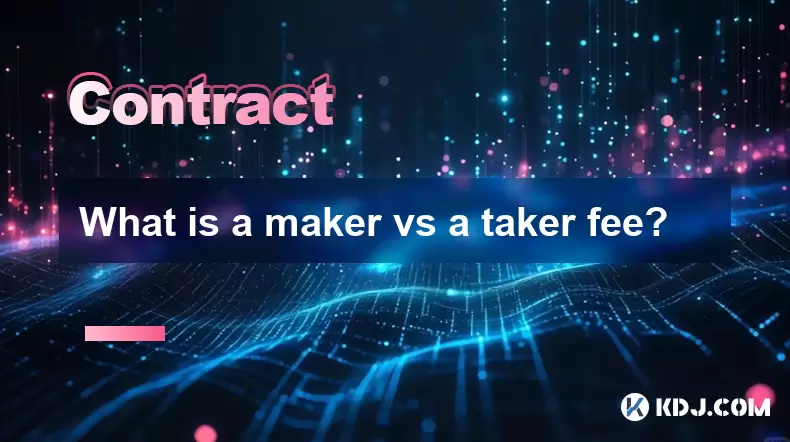
What is a maker vs a taker fee?
Jul 19,2025 at 01:14am
Understanding the Basics of Cryptocurrency Exchange FeesIn the world of cryptocurrency trading, maker vs taker fees are a fundamental concept that eve...

What is a partial liquidation?
Jul 19,2025 at 01:49am
Understanding the Basics of Partial LiquidationIn the world of cryptocurrency trading, especially within leveraged positions, partial liquidation refe...

Example of a Bitcoin futures trade
Jul 19,2025 at 12:43am
Understanding Bitcoin Futures TradingBitcoin futures trading is a financial instrument that allows investors to speculate on the future price of Bitco...
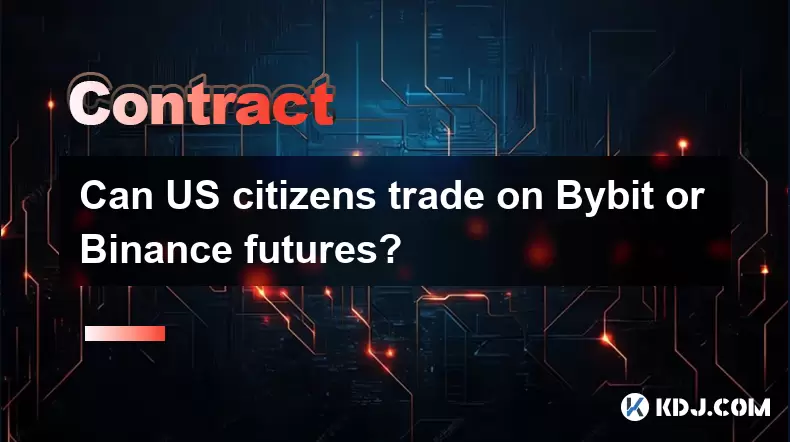
Can US citizens trade on Bybit or Binance futures?
Jul 18,2025 at 10:14pm
Understanding the Legal Status of US Citizens on Global Crypto ExchangesThe question of whether US citizens can trade on Bybit or Binance futures is o...
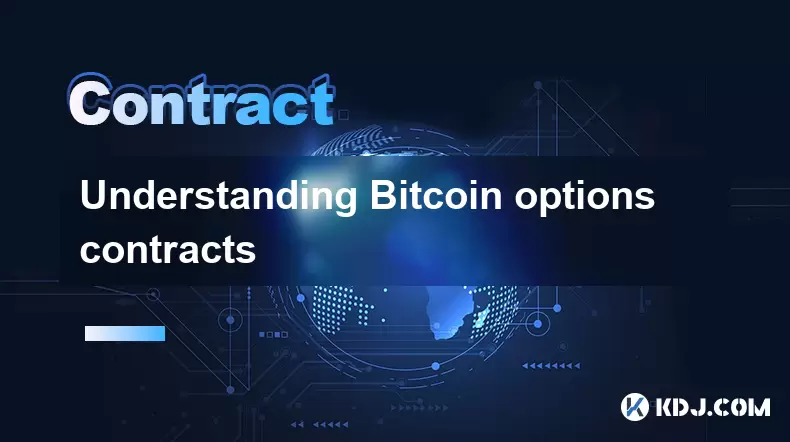
Understanding Bitcoin options contracts
Jul 18,2025 at 10:56pm
What Are Bitcoin Options Contracts?Bitcoin options contracts are financial derivatives that allow traders to speculate on the future price of Bitcoin ...

What is an Ethereum smart contract?
Jul 19,2025 at 01:01am
Understanding the Basics of Ethereum Smart ContractsAn Ethereum smart contract is a self-executing contract with the terms of the agreement directly w...

What is a maker vs a taker fee?
Jul 19,2025 at 01:14am
Understanding the Basics of Cryptocurrency Exchange FeesIn the world of cryptocurrency trading, maker vs taker fees are a fundamental concept that eve...

What is a partial liquidation?
Jul 19,2025 at 01:49am
Understanding the Basics of Partial LiquidationIn the world of cryptocurrency trading, especially within leveraged positions, partial liquidation refe...

Example of a Bitcoin futures trade
Jul 19,2025 at 12:43am
Understanding Bitcoin Futures TradingBitcoin futures trading is a financial instrument that allows investors to speculate on the future price of Bitco...

Can US citizens trade on Bybit or Binance futures?
Jul 18,2025 at 10:14pm
Understanding the Legal Status of US Citizens on Global Crypto ExchangesThe question of whether US citizens can trade on Bybit or Binance futures is o...

Understanding Bitcoin options contracts
Jul 18,2025 at 10:56pm
What Are Bitcoin Options Contracts?Bitcoin options contracts are financial derivatives that allow traders to speculate on the future price of Bitcoin ...

What is an Ethereum smart contract?
Jul 19,2025 at 01:01am
Understanding the Basics of Ethereum Smart ContractsAn Ethereum smart contract is a self-executing contract with the terms of the agreement directly w...
See all articles
























